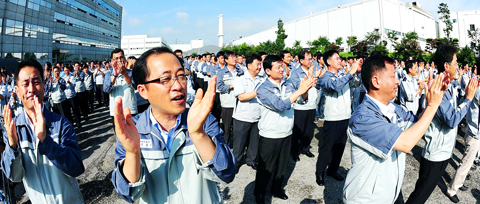Ailing South Korean automaker Ssangyong Motor resumed production yesterday after an 83-day hiatus caused by a crippling and violent strike, company officials said.
It took six days for a clean-up after police ended a 77-day occupation of the plant in protest at mass redundancies. More than 100 people were hurt in clashes last week, which left parts of the premises resembling a war zone.
“The passionate efforts by the staff and workers that enabled us to resume production today after only a week’s preparation will serve as a great momentum for the company’s turnaround,” Lee Yoo-il, a court-appointed manager, said in a statement.

PHOTO: EPA/YONHAP
He said the company would complete a redundancy program and submit a rescue plan to creditors for their approval by Sept. 15.
“Learning from the past hurtful experience, we will try to find an outside investor who is interested in long-term development of the company,” Lee said.
South Korea’s smallest automaker received court protection from creditors in February in exchange for a turnaround plan that calls for massive layoffs and cost savings.
China’s Shanghai Automotive Industry Corp retains a 51 percent stake in the company but lost management control when Ssangyong received protection from bankruptcy.
Unionists refusing to accept layoffs had battled riot police with giant catapults, firebombs and steel pipes at the plant in Pyeongtaek, 70km south of Seoul.
The violence clouded prospects for the carmaker’s survival and cost nearly 316 billion won (US$258.3 million) in lost production.

Chinese Nationalist Party (KMT) lawmakers have declared they survived recall votes to remove them from office today, although official results are still pending as the vote counting continues. Although final tallies from the Central Election Commission (CEC) are still pending, preliminary results indicate that the recall campaigns against all seven KMT lawmakers have fallen short. As of 6:10 pm, Taichung Legislators Yen Kuan-heng (顏寬恒) and Yang Chiung-ying (楊瓊瓔), Hsinchu County Legislator Lin Szu-ming (林思銘), Nantou County Legislator Ma Wen-chun (馬文君) and New Taipei City Legislator Lo Ming-tsai (羅明才) had all announced they

CHAMPIONS: President Lai congratulated the players’ outstanding performance, cheering them for marking a new milestone in the nation’s baseball history Taiwan on Sunday won their first Little League Baseball World Series (LLBWS) title in 29 years, as Taipei’s Dong Yuan Elementary School defeated a team from Las Vegas 7-0 in the championship game in South Williamsport, Pennsylvania. It was Taiwan’s first championship in the annual tournament since 1996, ending a nearly three-decade drought. “It has been a very long time ... and we finally made it,” Taiwan manager Lai Min-nan (賴敏男) said after the game. Lai said he last managed a Dong Yuan team in at the South Williamsport in 2015, when they were eliminated after four games. “There is

Nvidia Corp CEO Jensen Huang (黃仁勳) yesterday visited Taiwan Semiconductor Manufacturing Co (TSMC, 台積電), as the chipmaker prepares for volume production of Nvidia’s next-generation artificial intelligence (AI) chips. It was Huang’s third trip to Taiwan this year, indicating that Nvidia’s supply chain is deeply connected to Taiwan. Its partners also include packager Siliconware Precision Industries Co (矽品精密) and server makers Hon Hai Precision Industry Co (鴻海精密) and Quanta Computer Inc (廣達). “My main purpose is to visit TSMC,” Huang said yesterday. “As you know, we have next-generation architecture called Rubin. Rubin is very advanced. We have now taped out six brand new

POWER PLANT POLL: The TPP said the number of ‘yes’ votes showed that the energy policy should be corrected, and the KMT said the result was a win for the people’s voice The government does not rule out advanced nuclear energy generation if it meets the government’s three prerequisites, President William Lai (賴清德) said last night after the number of votes in favor of restarting a nuclear power plant outnumbered the “no” votes in a referendum yesterday. The referendum failed to pass, despite getting more “yes” votes, as the Referendum Act (公民投票法) states that the vote would only pass if the votes in favor account for more than one-fourth of the total number of eligible voters and outnumber the opposing votes. Yesterday’s referendum question was: “Do you agree that the Ma-anshan Nuclear Power Plant